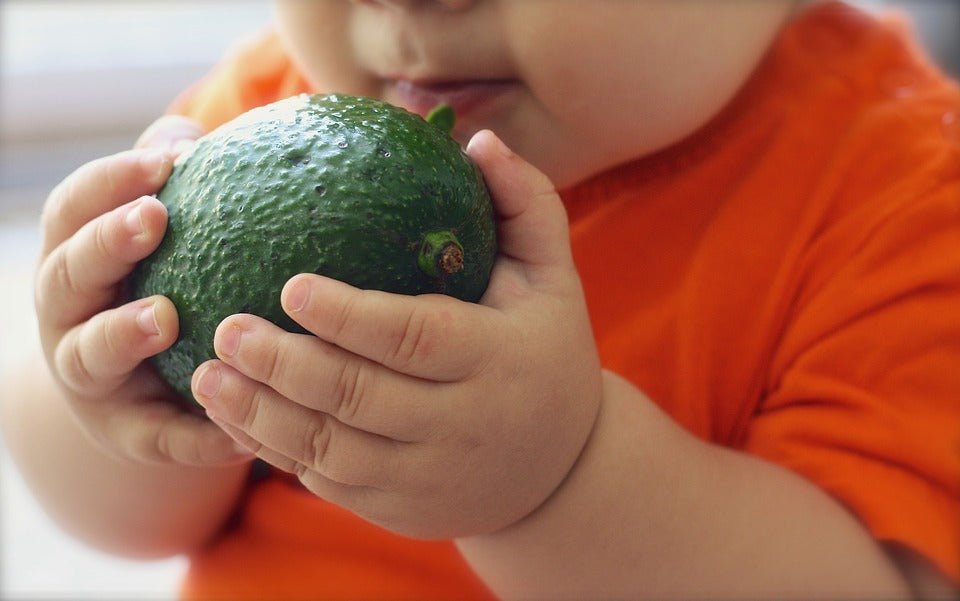Your Cart is Empty
Gift Sets
Categories

Top Superfoods for Your Baby!
by Amy Ma November 17, 2019 4 min read
It’s a fun and exploratory time when it comes to introducing solid foods to your baby! It’s also another stage to research into and one of the first questions that comes to mind is, “is my baby ready for solids?”. To answer this, you can observe your baby to look for these signs of readiness which usually happens at the 5-6 months mark:
- Your baby has good head and neck control and can sit upright when supported
- Your baby opens mouth when you offer food on a spoon
- Your baby shows an interest in food by looking at what is on your plate
- Your baby reaches for your food
- Your baby has good head and neck control and can sit upright when supported
If they are displaying all the above, then they are totally ready and it’s time to start the transition from liquids to solids. There’s a large variety of baby-friendly foods available and while it can be daunting at times, it is also fun looking at your baby’s faces as they try different flavors! Here are our top list of Superfoods, which are fantastic to add to your baby’s diet:
1. Bananas
Benefits:
Their sweet and mushy texture make it an easy to eat treat for babies. Bananas contain vitamins B6 and C, as well as calcium, iron and potassium. They help treat diarrhea and are super delicious! Another benefit is that they are easy to carry and peel, so when you’re on the go with your baby, be sure to pack a banana.
Serving Suggestion:
Simply mash it up and serve as is.
2. Broccoli
Benefits:
Broccoli has so many benefits, it’s hard to list them all. Let’s start with the fact it wards off cancer, a true superfood! It contains folic acid, iron, potassium and vitamin C and is also a great for your baby to get familiar with the taste. They may not like it the first time, but it doesn’t mean you should stop trying! Always try several more times to make sure they can get a taste for a full array of fruits and veggies. We recommend steaming it, to preserve all the goodness it has to offer.
Serving Suggestion:
Steam until soft, cut into pieces small enough for your child to eat safely, and then chill. If they don’t enjoy the taste, you can serve it with a sweet tasting vegetable like sweet potato.
3. Blueberries
Benefits:
Blueberries are rich in antioxidants and several vitamins like C, A and K, which are important for bone health. The blue hue of blueberries come from flavonoids. These flavonoids benefit your baby’s eyes, brain and urinary tract. They are also naturally sweet and most babies tend to really enjoy them!
Serving Suggestion:
Blend or mash blueberries and you can add to plain yoghurt to sweeten naturally. For older babies (8 months) cut up and allow them to chew – they are perfectly-sized for those tiny hands!
4. Lentils
Benefits:
Lentils are packed with fiber, protein, iron and vitamin B. They give moms major bang for your buck in the nutritional department! Simply boil and watch as they turn into the perfect mushy texture that is great for baby bites.
Serving Suggestion:
Try boiling lentils with thinly diced carrots. For a little extra flavor add finely grated ginger.
5. Chia Seeds
Benefits:
Chia seeds may be small but they sure are powerful! Full of antioxidants, calcium, omega-3 fatty acids, fibre, iron, potassium and protein, they are a great addition to your baby’s diet.
Serving Suggestion:
Stir through your baby’s yogurt or soak overnight in milk to make chia pudding
6. Salmon
Benefits:
This brain & eye superfood is excellent to give to your little one. High in omega-3 fatty acids, protein and minerals, salmon acts as an anti-inflammatory in the body.
Serving Suggestions:
Try poaching it and mashing it with a with a little milk
7. Sweet Potatoes
Benefits:
A baby favorite thanks to their sweet taste and pleasant texture. They not only taste good but ARE super delicious! The orange colored sweet potatoes are rich in beta-carotene, vitamin C, iron and copper.
Serving Suggestions:
Serve sweet potato puree alone or swirled into pureed chicken or turkey.
8. Avocados
Benefits:
Who doesn’t love avocados? This buttery fruit-vegetable is full of good fats which help with brain and vision development. They are also full of essential vitamins and minerals that are vital for developing babies.
Serving Suggestions:
Blend with banana for a creamy mousse-like treat for baby or mix into any fruit or veggie purée.
9. Whole Milk Yoghurt
Benefits:
Creamy yogurt is rich in calcium and vitamin D which are necessary for healthy bones and teeth. Also, opt for whole-milk yogurt as babies need the calories from fat. We also suggest getting organic, unsweetened yoghurt as you can add a natural sweetener like blueberries yourself.
Serving Suggestions:
Serve simply by itself or swirl in pureed berries or other fresh fruit, applesauce, or mashed avocado.
10. Winter Squash
Benefits:
Butternut, acorn and pumpkin are full of beta-carotene which are great for eyes. They are also full of vitamin C and are naturally sweet. Babies tend to enjoy squash and its texture.
Serving Suggestions:
Simply cook squash of your choice, puree and serve. When your baby gets older, you can introduce new flavors and textures with dishes like smashed chickpea and butternut chili.
It’s important to talk to the pediatrician about your baby's readiness for solids, and which foods to introduce and when. Then introduce foods one at a time, waiting at least three days after each new food to watch for any allergic reaction. Caution is always key! Please comment down below let us know about some of the foods your baby is loving!
Leave a comment
Comments will be approved before showing up.
Also in Latest Blog Posts

5 Common Newborn Skin Concerns and How to Address Them
by Adrian Ma February 24, 2026 6 min read
Bringing your newborn home is magical. It is also the moment you start noticing everything. Newborn skin is thinner, more delicate, and still developing. Because of this, many completely normal newborn skin changes can look alarming. Let us walk through the five most common conditions and exactly how to handle them confidently.

Long Lasting Organic Baby Clothes: Washing and Care Tips for Clothes That Truly Last
by Adrian Ma February 06, 2026 7 min read
Organic baby clothing is designed to be gentle on delicate skin, free from harsh chemicals, and made with natural fibers that breathe and soften over time. With the right care, these garments can last far beyond the newborn stage and become meaningful pieces passed down through siblings or even gifted to another family. This guide walks you through exactly how to wash, dry, and store organic baby clothes so they maintain their quality and comfort for the long run.

New Year, New Mindset for 2026: Embracing Body Positivity in Motherhood
by Adrian Ma January 27, 2026 6 min read
Learn how to embrace body positivity after pregnancy with practical, research-backed strategies for postpartum mothers in 2026.
Recently viewed products
Sign up to get 15% OFF your first order
Sign up to get the latest on sales, new releases and more …
